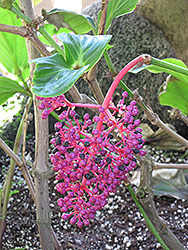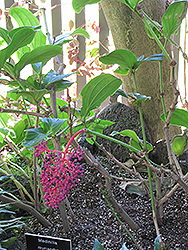>> Home
Height: 4 feet
Spread: 4 feet
Sunlight:
![]()
![]()
Hardiness Zone: 9b
Description:
A stunning tropical plant that is great for shady areas or containers; a fine houseplant for colder climates; pale pink flowers that resemble small grapes turn bright magenta, with purple tones, with deep green glossy leaves for contrast; likes loose soil
Ornamental Features
Malaysian Grapes features showy clusters of shell pink ball-shaped flowers with hot pink overtones at the ends of the branches from late winter to late fall. The flowers are excellent for cutting. It has attractive dark green foliage with light green undersides. The glossy pointy leaves are highly ornamental and remain dark green throughout the winter.
Landscape Attributes
Malaysian Grapes is a multi-stemmed evergreen shrub with an upright spreading habit of growth. Its relatively coarse texture can be used to stand it apart from other landscape plants with finer foliage.
This is a relatively low maintenance shrub. Trim off the flower heads after they fade and die to encourage more blooms late into the season. It has no significant negative characteristics.
Malaysian Grapes is recommended for the following landscape applications;
- Accent
- General Garden Use
- Container Planting
Planting & Growing
Malaysian Grapes will grow to be about 4 feet tall at maturity, with a spread of 4 feet. It has a low canopy with a typical clearance of 1 foot from the ground. It grows at a medium rate, and under ideal conditions can be expected to live for approximately 20 years.
This shrub does best in partial shade to shade. It prefers to grow in average to moist conditions, and shouldn't be allowed to dry out. It is not particular as to soil pH, but grows best in rich soils. It is somewhat tolerant of urban pollution. This species is not originally from North America. It can be propagated by cuttings.
Malaysian Grapes makes a fine choice for the outdoor landscape, but it is also well-suited for use in outdoor pots and containers. With its upright habit of growth, it is best suited for use as a 'thriller' in the 'spiller-thriller-filler' container combination; plant it near the center of the pot, surrounded by smaller plants and those that spill over the edges. It is even sizeable enough that it can be grown alone in a suitable container. Note that when grown in a container, it may not perform exactly as indicated on the tag - this is to be expected. Also note that when growing plants in outdoor containers and baskets, they may require more frequent waterings than they would in the yard or garden. Be aware that in our climate, most plants cannot be expected to survive the winter if left in containers outdoors, and this plant is no exception. Contact our experts for more information on how to protect it over the winter months.

